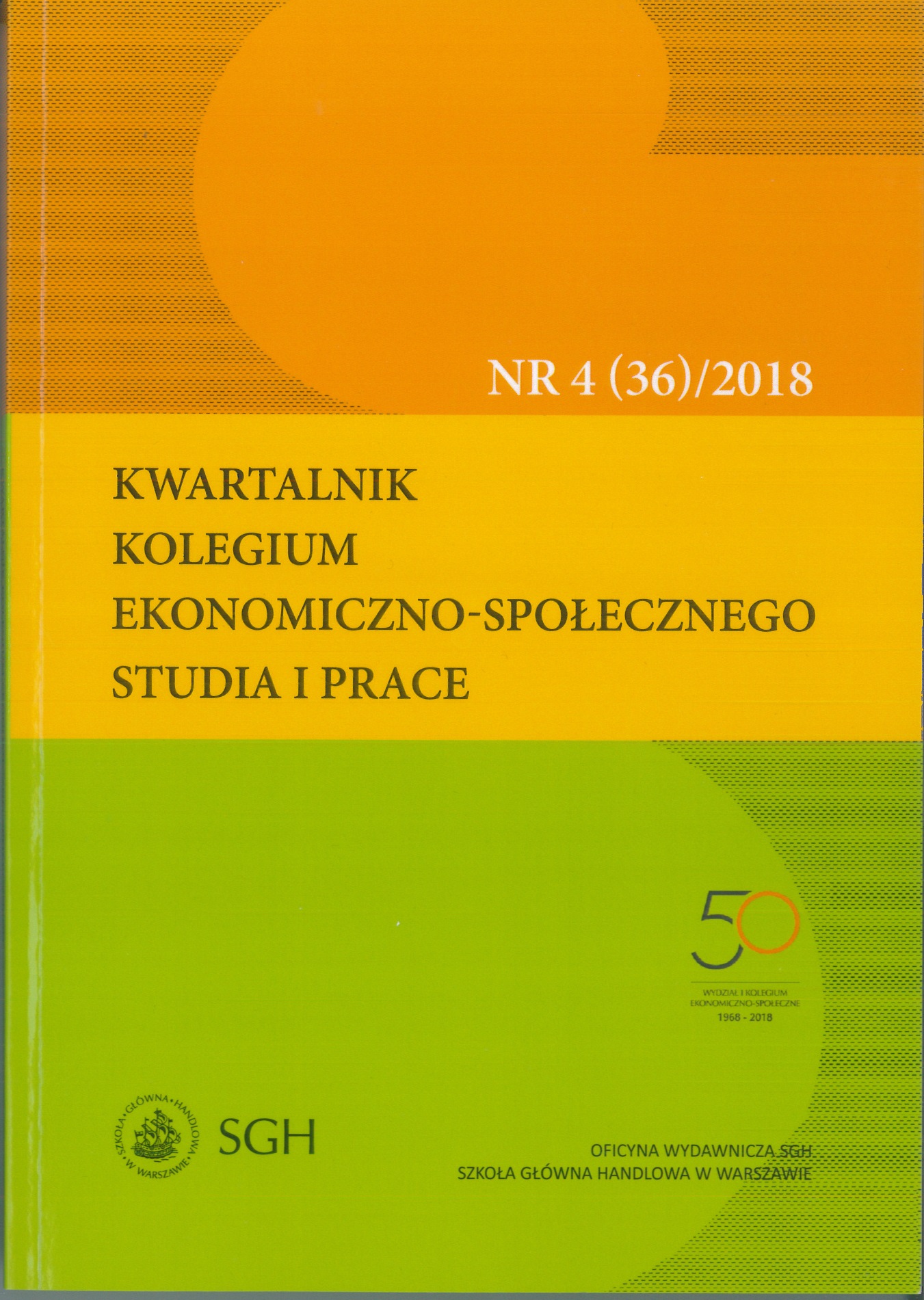The impact of the Family 500+ Programme on the quality of life of Polish households
Main Article Content
Abstract
The quality of life as a concept is considered from the point of view of different sciences. The quality of life reflects the level of satisfying the needs, and also the supply of the household with vital elements. The quality of households’ life is connected with their wealth and affluence. In addition to the income earned by households for their work, some of them receive a variety of family-oriented benefits. Benefits like that include those from the Family 500+ Programme. The purpose of this article is to indicate a uniform and synthetic definition of the term ‘‘quality of life’’. The author describes the framework of the Family 500+ Programme as an instrument of pro-family policy and its impact on the quality of life. The research methodology includes: critical analysis of the literature, the method of examining documents and the analytical and the descriptive method. In addition, to survey Polish households, the diagnostic survey method was used. The practical consequence and the social implication of the article is the inference about the Family 500+ Programme and the possibility of using the research for further analysis. Besides, the article may be a guide to creating pro-family programmes, as well as adjusting the offers of the financial sector for households.
Downloads
Article Details
Autor (Autorzy) artykułu oświadcza, że przesłane opracowanie nie narusza praw autorskich osób trzecich. Wyraża zgodę na poddanie artykułu procedurze recenzji oraz dokonanie zmian redakcyjnych. Przenosi nieodpłatnie na Oficynę Wydawniczą SGH autorskie prawa majątkowe do utworu na polach eksploatacji wymienionych w art. 50 Ustawy z dnia 4 lutego 1994 r. o prawie autorskim i prawach pokrewnych – pod warunkiem, że praca została zaakceptowana do publikacji i opublikowana.
Oficyna Wydawnicza SGH posiada autorskie prawa majątkowe do wszystkich treści czasopisma. Zamieszczenie tekstu artykuły w repozytorium, na stronie domowej autora lub na innej stronie jest dozwolone o ile nie wiąże się z pozyskiwaniem korzyści majątkowych, a tekst wyposażony będzie w informacje źródłowe (w tym również tytuł, rok, numer i adres internetowy czasopisma).
Osoby zainteresowane komercyjnym wykorzystaniem zawartości czasopisma proszone są o kontakt z Redakcją.
References
2. Bywalec Cz., Konsumpcja a rozwój gospodarczy i społeczny, C. H. Beck, Warszawa 2010.
3. Czech A., Słaby T., Ocena poziomu życia gospodarstw domowych według województw – meandry analizy taksonomicznej, „Wiadomości Statystyczne” nr 10 (677), 2017.
4. Diener E., Eunkook S., Measuring quality of life: Economic, social, and subjective indicators, [w:] Social indicators research (40), Springer Netherlands, Dordrecht 1997.
5. Galloway S., Section 1: A Literature Review, [w:] Scottish Executive Social Research, Quality of Life and Well-being: Measuring the Benefits of Culture and Sport: Literature Review and Thinkpiece, Social Research, Edinburgh 2005.
6. Kaczmarczyk S., Badania marketingowe. Podstawy metodyczne, PWE, Warszawa 2011.
7. Krause P., Quality of Life and Inequality, German Socio-Economic Panel Study, Berlin 2015.
8. Niśkiewicz Z., Dobrostan psychiczny i jego rola w życiu człowieka, „Studia Krytyczne” nr 3, Wydawnictwo UO, Opole 2016.
9. Okrasa W., Gudaszewski G., Przestrzenne aspekty alokacji świadczeń dla rodzin, deprywacja lokalna a rozkład środków z Programu 500+, [w:] Sytuacja demograficzna województwa pomorskiego jako wyzwanie dla polityki społecznej i gospodarczej, t. XIV, red. J. Hrynkiewicz, A. Potrykowska, Rządowa Rada Ludnościowa, Warszawa 2017.
10. Owsiński J., Tarchalski T., Pomiar jakości życia. Uwagi na marginesie pewnego rankingu, „Współczesne Problemy Zarządzania” nr 1, Wydawnictwo WSISiZ, Warszawa 2008.
11. Panek T., Hierarchiczny model pomiaru jakości życia, „Wiadomości Statystyczne. Czasopismo GUS i PTS” nr 6 (649), 2015.
12. Paraskevi T., Quality of Life: Definition and Measurement, „Europe’s Journal of Psychology” Vol. 9 (1), EJOP, Leibniz 2013.
13. Petelewicz M., Drabowicz T., Jakość życia – globalnie i lokalnie. Pomiar i wizualizacja, Wydawnictwo UŁ, Łódź 2016.
14. Rapley M., Quality of Life Research – a critical introduction, Sage, London 2003.
15. Smith D., The geography of social well-being in the United States: An introduction to territorial social indicators, McGraw-Hill, New York 1973.
16. Sobociński M., Polska polityka rodzinna w latach 1989–2015. Próba podsumowania, „Biuro Analiz Sejmowych” nr 8 (212), 2016.
17. Somopolska-Rzechła A., Jakość życia jako kategoria ekonomiczna, „Folia Pomeranae Universitatis Technologiae Stetinensis” nr 301 (71), 2014.
18. Trzebiatowski J., Jakość życia w perspektywie nauk społecznych i medycznych – systematyzacja ujęć definicyjnych, „Hygeia Public Health” nr 46 (1), Wydawnictwo UM w Poznaniu, Poznań 2011.
19. Wnuk M., Marcinkowski J., Jakość życia jako pojęcie pluralistyczne o charakterze interdyscyplinarnym, „Problemy Higieny i Epidemiologii” nr 93 (1), 2012.
20. ec.europa.eu/eurostat
21. www.nbp.pl
22. www.stat.gov.pl
